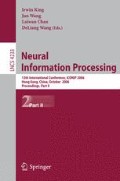Abstract
As long leading-time hydrological forecast is a complex non-linear procedure, traditional methods are easy to get slow convergence and low efficiency. The basic relevance vector machine (BRVM) and the developed sequential relevance vector machine (SRVM) are employed to forecast multi-step ahead hydrological time series. The relevance vector machine is a sparse approximate Bayesian kernel method, and it provides full probabilistic forecasting results, which is helpful for hydrological engineering decision. BRVM and SRVM are respectively applied to the annual coming runoff forecast of Three Gorges hydropower station as case study. When compared with auto regression moving average models, BRVM exhibits high model efficiency and provides satisfying forecasting precision. SRVM is potential for its increased freedom and adaptive model selection mechanism. Comparison is also made within direct forecast and iterative one-step ahead forecasting for multi-step ahead forecasting, and the latter shows the ability of highlighting the model performance.
Access this chapter
Tax calculation will be finalised at checkout
Purchases are for personal use only
Preview
Unable to display preview. Download preview PDF.
References
Fan, X.Z.: Mid and Long-term Hydrologic Forecast. Hehai University Publishing Company, Nanjing (1999)
Guire, M.M., Wood, A.W., Hamlet, A.F., Lettenmaier, D.P.: Use of Satellite Data for Streamflow and Reservoir Storage Forecasts in the Snake River Basin. Journal of Water Resources Planning and Management 132(2), 97–110 (2006)
Qin, G.H., Ding, J., Li, M.M., Ni, C.J.: Application of ANNs with Sensitive Ability to Hydrologic Forecast. Advances in Water Science 14(2), 163–166 (2003)
Yuan, J., Zhang, X.F.: Real-time Hydrological Forecasting Method of Artificial Neural Network Based on Forgetting Factor. Advances in Water Science 15(6), 787–792 (2004)
Liu, F., Zhou, J.Z., Yang, J.J., Qiu, F.P.: The Application of Fuzzy System with Recursive Least Squares Method to Mid and Long-Term Runoff Forecast. In: Proceedings of World Water and Environmental Resources Congress, Anchorage, Alaska, USA, pp. 337–344 (2005)
Liu, S.H., Mao, H.M.: A New Prediction of Hydrology Time Series. Engineering Journal of Wuhan University 35(4), 53–56 (2002)
NIkolaev, N.: Sequential Relevance Vector Machine Learning from Time Series. In: Proceedings of International Joint Conference on Neural Networks, Montreal, Canadapp, pp. 1308–1313 (2005)
Tipping, M.E.: The Relevance Vector Machine. In: Proceedings of Advances in Neural Information Processing Systems 12, pp. 652–658. MIT Press, Cambridge (2000)
Shevade, S.K., Sundararajian, S., Keerthi, S.S.: Predictive Approaches for Sparse Model Learning. In: Pal, N.R., Kasabov, N., Mudi, R.K., Pal, S., Parui, S.K. (eds.) ICONIP 2004. LNCS, vol. 3316, pp. 434–439. Springer, Heidelberg (2004)
Tipping, M.E., Faul, A.: Fast Marginal Likelihood Maximisation for Sparse Bayesian models. In: Proceedings of the Ninth International Workshop on Social Intelligence Statistics, Key West (2003)
Neal, R.M.: Bayesian Learning for Neural Networks. Lecture Notes in Statistics, vol. 118. Springer, New York (1996)
Vapnik, V.N.: Statistical Learning Theory. Wiley, New York (1998)
Tipping, M.E.: Sparse Bayesian Learning and the Relevance Vector Machine. Journal of Machine Learning Research 1(2), 211–244 (2001)
Faul, A., Tipping, M.E.: Analysis of Sparse Bayesian Learning. In: Proceedings of NIPS (2001)
Candela, J.Q., Girard, A., Larsen, J., Rasmussen, C.E.: Propagation of Uncertainty in Bayesian Kernel Models – Application to Multi-step Ahead Forecasting. In: Proceedings of ICASSP (2003)
Tipping, M.E.: Bayesian Inference: An Introduction to Principles and Practice in Machine Learning. In: Proceedings of Advanced Lectures on Machine Learning, pp. 41–62. Springer, Heidelberg (2004)
Candela, J.Q., Hansen, L.K.: Time Series Prediction Based on The Relevance Vector Machine with Adaptive Kernels. In: Proceedings of IEEE International Conference on Acoustics, Speech, and Signal Processing, pp. 985–988 (2003)
Author information
Authors and Affiliations
Editor information
Editors and Affiliations
Rights and permissions
Copyright information
© 2006 Springer-Verlag Berlin Heidelberg
About this paper
Cite this paper
Liu, F., Zhou, JZ., Qiu, FP., Yang, JJ., Liu, L. (2006). Nonlinear Hydrological Time Series Forecasting Based on the Relevance Vector Regression. In: King, I., Wang, J., Chan, LW., Wang, D. (eds) Neural Information Processing. ICONIP 2006. Lecture Notes in Computer Science, vol 4233. Springer, Berlin, Heidelberg. https://doi.org/10.1007/11893257_97
Download citation
DOI: https://doi.org/10.1007/11893257_97
Publisher Name: Springer, Berlin, Heidelberg
Print ISBN: 978-3-540-46481-5
Online ISBN: 978-3-540-46482-2
eBook Packages: Computer ScienceComputer Science (R0)

